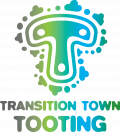Transition Conference Report – Charles
Two of us have just been to the annual Transition Network Conference in Liverpool
Each of the 200-plus participants probably had a unique experience of the 3 days. Much of the time was offered in chunks of options…
Exciting choices, because most of the parallel sessions looked tempting…but you needed to select just one! What would you do: choose a very popular one with 40 people signed up, or go for a topic with a smaller group of 5? And would you prefer to be meeting the same people, or new ones?
My choices took me to sessions on social justice, on community renewable energy, on health in cities, on a long evening walk with a forester in local woods and fields, and on Kids in Transition.
Why does Transition need kids in order to flourish?
Why do kids need Transition in order to flourish?
Another choice: what would you do at meals…sit with ‘strangers’ you had not met before? That’s what I decided to do, and I loved hearing about Transition projects at different stages of development: in Paris or Sao Paulo, on an island in Denmark, in Switzerland, and in Liverpool itself.
So, you could make your own conference very personal…which I felt was exactly as it should be. ‘Transition’ has straightforward goals: building resilient communities in a post-carbon world – and it’s the diversity of routes to get there, and of local needs, that offers each of us as individuals the challenge to use our different skills. We’ve got some great things to do together in Tooting!
A fuller report on the conference, contributed by many participants, can be read at:
http://transitionculture.org/2011/07/15/full-round-up-of-materials-from-the-2011-transition-network-conference/

